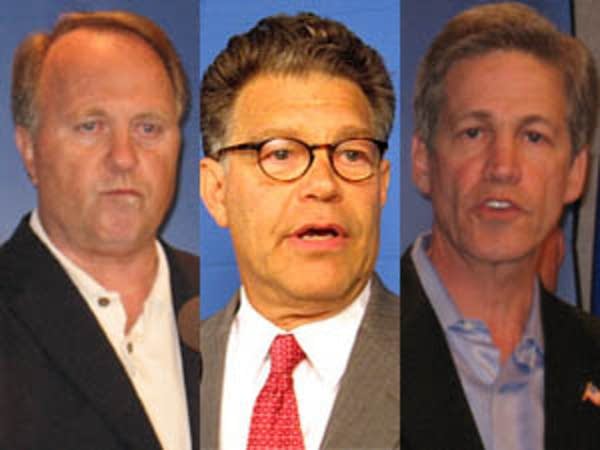US Senate candidates emphasize their differences in debate

DFLer Al Franken said terrorism poses the biggest threat to the nation. Franken blamed Republican Sen. Norm Coleman for his support of the war in Iraq. Franken said Iraq has been a distraction from the war on terrorism the U.S. initially launched in Afghanistan.
"We started right. We went after al Qaeda and the Taliban but we didn't finish the job, and we got sidetracked to Iraq," said Franken. "And because we were sidetracked to Iraq we have made ourselves less secure."
Independence Party candidate Dean Barkley said the growing national debt poses the biggest threat to America. Barkley blamed Coleman for his part in making that debt larger.
"I feel very lonely when I start talking about where we're headed financially in this country, a $10.3 trillion debt. How much more abuse are we going to give to our kids? I call it financial child abuse, what we're doing to future generations," said Barkley. "We're the first generation of Americans who are going to leave our country in worse shape than we inherited it, but we can change it. I mean how much more can we do? And 40 percent of that debt, Norm, was incurred on your watch."
Create a More Connected Minnesota
MPR News is your trusted resource for the news you need. With your support, MPR News brings accessible, courageous journalism and authentic conversation to everyone - free of paywalls and barriers. Your gift makes a difference.
Coleman said the biggest threat facing the nation is partisan bickering and gridlock in Washington.
"If we can overcome the partisan divide, we can make a difference. That's what I have done my entire career," said Coleman.
An estimated 500 people gathered in an auditorium at Breck School to see the Senate candidates. Each of the three campaigns got 100 seats. It looked like the balance went to students.
Just as was the case in their first debate last weekend in Rochester, the Senate candidates spent a considerable amount of time talking about the economic crisis.
Barkley and Franken accused Coleman of falling down on his oversight duties. Coleman responded by saying that pointing fingers was not going to solve the financial problems.
Coleman criticized Franken for not supporting the bailout even though so many other members of Franken's party did -- including Democratic presidential candidate Barack Obama.
"The bottom line -- you've got to do something," said Coleman. "You can't sit in the cheep seats and look down and say, 'Well, I'm going to make it better.' You can't simply say no."
Although Coleman was clearly going after Franken for Franken's criticism of the bailout, it was Barkley who took Coleman to task for his "pointing fingers" remark.
"I don't think it's negative, where I bring up how this happened," said Barkley. "Smart people learn from history. They don't repeat mistakes."
To improve the economy, Coleman and Barkley said Congress needs to come together. Franken promoted using the Small Business Administration to extend credit to companies, and he proposed using several billion dollars earmarked for projects in Iraq to instead rebuild U.S. infrastructure.
Throughout the debate, Coleman talked about his record of passing legislation through compromise. He repeatedly suggested that Franken would not be effective in the Senate, charging that Franken would not compromise.
Franken defended his opposition to some of the legislation Coleman referenced, including the 2005 energy act -- which included major funding for renewable fuels but also billions in subsidies for the oil industry.
Barkley, once again, sharply went after Coleman over the senator's "bringing people together" theme.
"I don't like going after you Norm, but, you know this 'getting things done,' 'bringing people together, I'm the guy that can get things done,' ... this whole economic collapse -- not to blame you, but it was one your watch. You guys were asleep," said Barkley.
On Social Security, Coleman suggested something like a military base closing commission should be put together to determine what needs to be done to keep Social Security solvent.
"Social Security, by the way, is an issue that is too big for one party to solve," said Coleman. "And unfortunately, reality has shown us that it gets mired in politics, so you take it out of politics."
Franken downplayed the urgency of addressing Social Security.
"Eventually we may have to have a solution to this, and we did it. The last time we did it was in 1983. At that time the trust fund was about four months away from insolvency. We can solve this down the road," Franken said.
Barkley says there's no mystery to what needs to be done to shore up Social Security. The problem, Barkley says, is that the solutions are politically unpopular -- increasing taxes or reducing benefits.
"The solutions are not difficult but nobody wants to offend anybody," said Barkley. "That's why we always say, 'Well, let's study it some more.'"
On foreign policy, the candidates agreed that the option of taking military action against Iran needs to remain on the table to prevent Iran from acquiring nuclear weapons.
Barkley, Coleman and Franken meet again for their third debate next week in Duluth.
